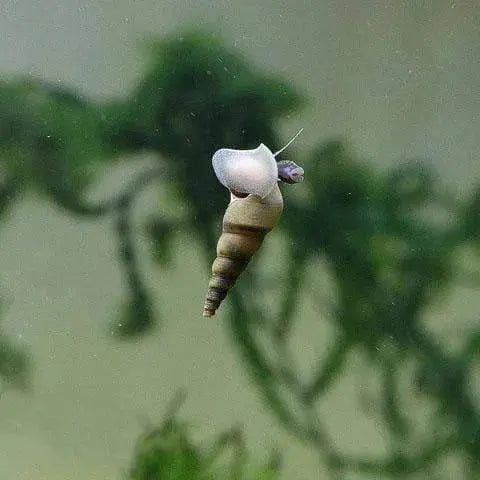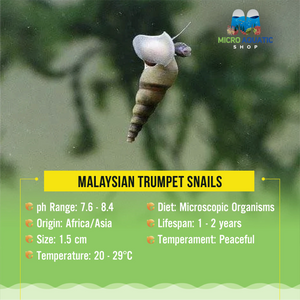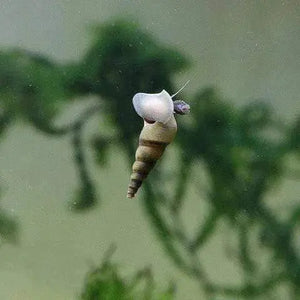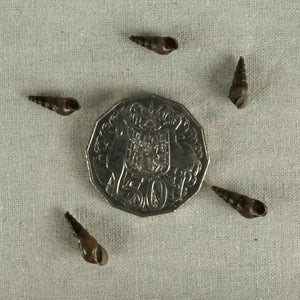Malaysian Trumpet Snails
Order today - receive it in as little as 3-5 days.
Return within 30 days of purchase. Duties & taxes are non-refundable.
Guarantee Safe Checkout
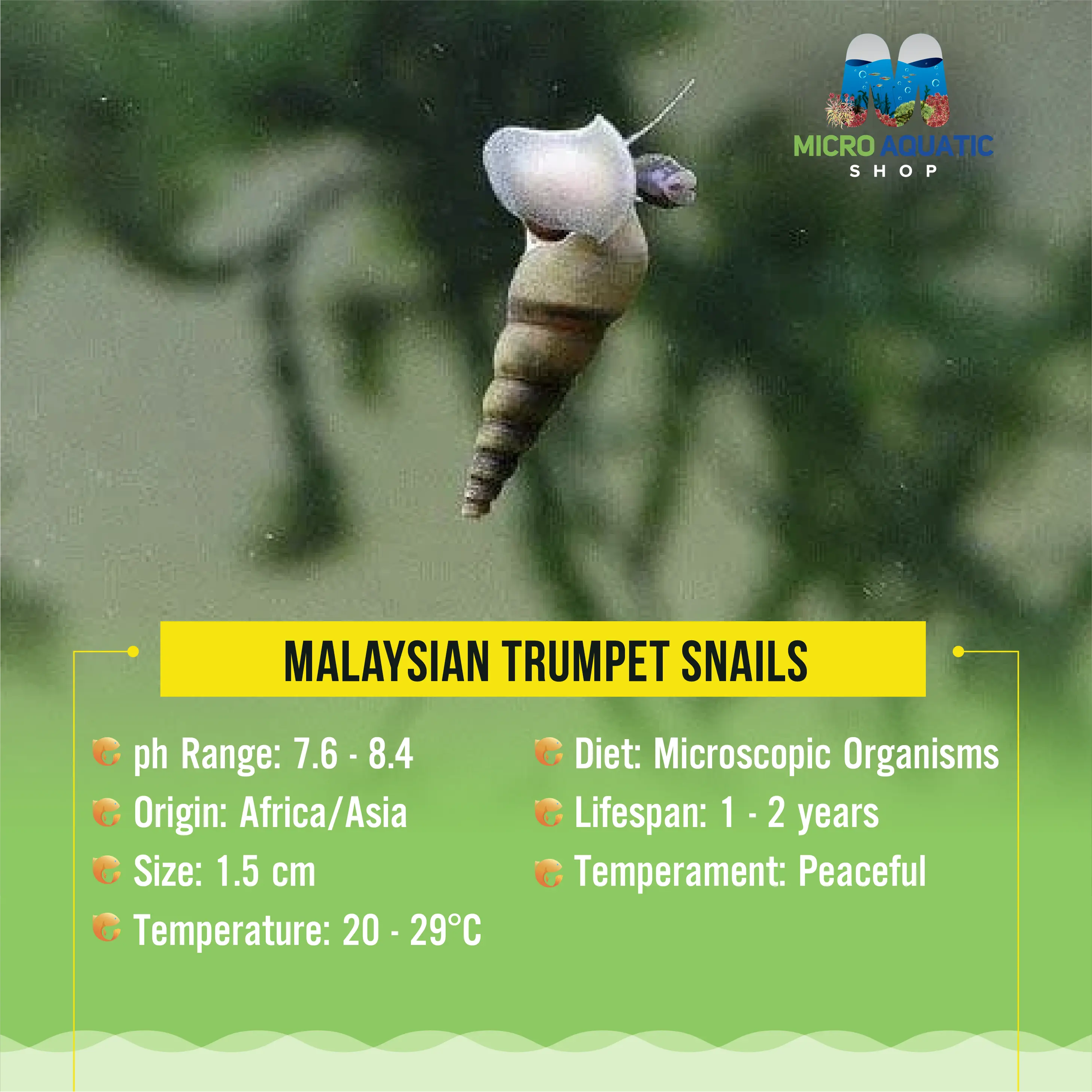
Malaysian Trumpet Snails
Malaysian Trumpet Snails (Melanoides Tuberculata) - Essential Aquarium Snails
We're excited to explore the world of Malaysian Trumpet Snails, also known as Melanoides Tuberculata. These snails are not just helpful cleaners but are also vital for many aquarium lovers. In this guide, we'll look at their physical traits, where they come from, and how they behave. We'll also see the many benefits they bring to your tank.  The Malaysian Trumpet Snail is a freshwater snail known for being both a helpful cleaner and a potential pest. While they might be seen as invasive in some places, they play a key role in keeping your tank healthy. We'll discuss why these snails are crucial for many aquariums and how to care for them properly.
The Malaysian Trumpet Snail is a freshwater snail known for being both a helpful cleaner and a potential pest. While they might be seen as invasive in some places, they play a key role in keeping your tank healthy. We'll discuss why these snails are crucial for many aquariums and how to care for them properly.
Key Takeaways
- Malaysian Trumpet Snails (Melanoides Tuberculata) are freshwater snails that can be both beneficial and problematic in aquariums
- They are known for their ability to clean up excess waste and algae, making them a valuable addition to many aquarium setups
- Understanding their physical characteristics, natural habitat, and behaviour patterns is crucial for proper care and management
- Proper water parameters, feeding, and tank setup are essential for maintaining a healthy Malaysian Trumpet Snail population
- Controlling their population growth is important to prevent them from becoming an invasive species in your aquarium
Understanding Malaysian Trumpet Snails (Melanoides Tuberculata)
Malaysian Trumpet Snails, or Malayan livebearing snails, are fascinating creatures in freshwater aquariums. They are not just visually appealing but also crucial for the health of our underwater worlds.
Physical Characteristics and Appearance
These snails have spiral, conical shells that can be brown or black. Their shells have ridges and tubercles, making them stand out. They grow up to 2.5 centimetres, fitting well in most aquariums.
Natural Habitat and Distribution
From tropical Southeast Asia, Malaysian Trumpet Snails live in various freshwater places. They thrive in rivers, lakes, and wetlands. Their adaptability has made them common hitchhikers in the aquarium trade, spreading worldwide.
Behaviour Patterns in Aquariums
In aquariums, these snails show interesting behaviour. They reproduce quickly, with females giving birth to live young. This can lead to fast-growing populations, so owners must monitor them closely. Despite their numbers, they help control algae and aerate the substrate.
| Characteristic | Description |
| Shell Shape | Spiral-shaped, conical |
| Shell Colour | Brown to Black |
| Maximum Size | Around 2.5 cm |
| Native Habitat | Tropical Freshwater Regions of Southeast Asia |
| Reproduction | Rapid, Livebearing |
Benefits of Malaysian Trumpet Snails in Your Aquarium
Keeping our aquariums balanced and thriving is key. The Malaysian Trumpet Snail (Melanoides Tuberculata) is a great addition. These snails bring many benefits that improve our aquarium's health and look. Firstly, they are excellent at eating algae. They munch on algae in the substrate, keeping our tanks clean. This makes our tanks look better and helps manage bioload, reducing organic waste. They also help with aeration. By burrowing, they create tunnels that bring oxygen to the substrate. This is good for plant roots and keeps the tank healthy. It helps with nutrient cycling, making the tank a better place for fish. Interestingly, these snails can be a food source for some fish. Fish like loaches and cichlids can eat them. This adds to the fish's diet, improving their health. But, their numbers can grow too high if not managed. We need to control their population to keep them beneficial. We'll discuss how to do this in later sections.
Proper Care and Maintenance Requirements
To keep Malaysian Trumpet Snails (Melanoides Tuberculata) healthy in your aquarium, you need to pay close attention to their needs. Let's explore the key factors for their care and well-being.
Optimal Water Parameters
These freshwater snails do well in various water conditions. But, they love the following for their best home:
- Temperature: 22-28°C (72-82°F)
- pH: 6.5-8.0
- Hardness: 5-20 dGH
Keeping the water quality stable is key for their health and life span. Regular water tests and partial changes help keep these conditions right.
Diet and Feeding Schedule
Malaysian Trumpet Snails mainly eat decaying plant matter, algae, and organic debris. For their best health, offer a mix of:
- Algae wafers or blanched veggies (like spinach or zucchini)
- Sinking pellets or granules for bottom-dwellers
- Leftover fish food or plant trimmings
Don't overfeed, as it can harm the water quality and your snails. Feed them 2-3 times a week, adjusting amounts based on their numbers and leftovers.
Tank Setup and Environment
| Tank Requirement | Recommendation |
| Substrate | Fine gravel or sand for burrowing |
| Decor | Smooth rocks, driftwood, and live plants for hiding |
| Filtration | Moderate to strong, focusing on mechanical and biological |
| Lighting | Moderate to low, as they prefer dimmer spots |
By setting up their environment to match their natural preferences, you can ensure their health. This also prevents them from becoming pests or harming live plants.
Managing Population Growth and Control
Malaysian Trumpet Snails are fascinating, but their fast breeding can be a problem. They multiply quickly, which can upset the balance in our aquariums. But, with smart strategies, we can manage their numbers and keep our tanks healthy.  Introducing natural predators is a good way to control their numbers. Fish like Puffer Fish, Loaches, and Cichlids love to eat these snails. By choosing the right tank mates, we can use nature to keep the snail population in check. Manual removal is another effective method. Regular vacuuming or siphoning can get rid of too many snails, especially the young ones. This helps keep the bioload balanced and prevents population control issues. Environmental factors also play a big part in controlling their breeding. Keeping the water just right, with the right pH, temperature, and oxygen, can slow down their breeding. By making the water perfect for them, we can limit their numbers. To manage Trumpet Snails well, we need to use a few different methods. Natural predators, manual removal, and controlling the environment all help. This way, we can enjoy these interesting snails in our aquariums without worrying about population control problems.
Introducing natural predators is a good way to control their numbers. Fish like Puffer Fish, Loaches, and Cichlids love to eat these snails. By choosing the right tank mates, we can use nature to keep the snail population in check. Manual removal is another effective method. Regular vacuuming or siphoning can get rid of too many snails, especially the young ones. This helps keep the bioload balanced and prevents population control issues. Environmental factors also play a big part in controlling their breeding. Keeping the water just right, with the right pH, temperature, and oxygen, can slow down their breeding. By making the water perfect for them, we can limit their numbers. To manage Trumpet Snails well, we need to use a few different methods. Natural predators, manual removal, and controlling the environment all help. This way, we can enjoy these interesting snails in our aquariums without worrying about population control problems.
Common Challenges and Solutions
Malaysian Trumpet Snails are great for aquariums but can cause some issues. It's important to manage and understand them well. This keeps the aquarium balanced and healthy.
Prevention of Over Breeding
One big worry is that these snails are breeding too much. They can quickly take over the tank. To stop this, watch the snail numbers closely and act fast.
- Regularly remove extra snails and find them a new home or dispose of them properly.
- Make sure the tank has the right number of snails for its size and other fish.
- Use a good substrate vacuum during water changes to get rid of snail eggs and young.
Health Issues and Treatment
Malaysian Trumpet Snails are usually tough but can get sick. They might get shell color changes, lesions, or parasites. It's key to spot and treat these problems quickly. Seeing a vet or an experienced fish keeper can help figure out the best treatment.
Integration with Other Tank Mates
These snails can live with many other fish, but it's important to pick the right ones. Some fish might see the snails as food. Choose tank mates carefully to keep the snails safe. By tackling these common problems, you can manage your snail population well. This way, you can enjoy the benefits they bring to your aquarium.
Conclusion
We've looked into Malaysian Trumpet Snails, or Melanoides tuberculata. They have interesting traits and benefits for aquariums. They help keep water clean, aerate the substrate, and fight algae.  But, we must consider the downsides too. They can multiply too much and become pests. Knowing their habits and managing their numbers is key to a balanced aquarium. If you want to add Malaysian Trumpet Snails to your tank, Micro Aquatic Shop can help. They offer advice and top-notch products. This ensures these snails thrive in our underwater worlds.
But, we must consider the downsides too. They can multiply too much and become pests. Knowing their habits and managing their numbers is key to a balanced aquarium. If you want to add Malaysian Trumpet Snails to your tank, Micro Aquatic Shop can help. They offer advice and top-notch products. This ensures these snails thrive in our underwater worlds.
FAQ
What are Malaysian Trumpet Snails, and why are they considered essential for aquariums?
Malaysian Trumpet Snails, also known as Melanoides Tuberculata, are fascinating freshwater snails. They are vital for aquarium ecosystems. Many aquarium enthusiasts find them essential due to their unique traits and benefits.
What are the physical features and natural habitat of Malaysian Trumpet Snails?
These snails have elongated, spiral-shaped shells in various colours, from brown to black. They are found in Asia, Africa, and the Middle East. They prefer slow-moving or stagnant freshwater habitats like ponds and lakes.
How do Malaysian Trumpet Snails behave in aquarium settings?
In aquariums, they burrow into the substrate, improving tank aeration and nutrient cycling. They are active at night, eating leftover food and algae.
What are the benefits of having Malaysian Trumpet Snails in an aquarium?
They are excellent algae eaters, helping to keep the tank balanced. They also help with substrate aeration and nutrient cycling. This is good for plant growth and overall tank health.
How do we properly care for and maintain Malaysian Trumpet Snails in an aquarium?
It's important to keep the right water parameters, like temperature, pH, and hardness. They have specific dietary needs. Creating an optimal tank environment is key to their well-being.
How can we manage the population growth of Malaysian Trumpet Snails in an aquarium?
Their rapid reproduction can lead to overpopulation. To control this, we can introduce natural predators, manually remove excess snails, and maintain a balanced ecosystem.
What are some common challenges and solutions when keeping Malaysian Trumpet Snails in an aquarium?
They can overbreed, face health issues, and conflict with other tank inhabitants. We'll discuss solutions to these challenges for a harmonious aquarium environment.
| Size |
5pcs, 10pcs, 1pcs |
|---|

